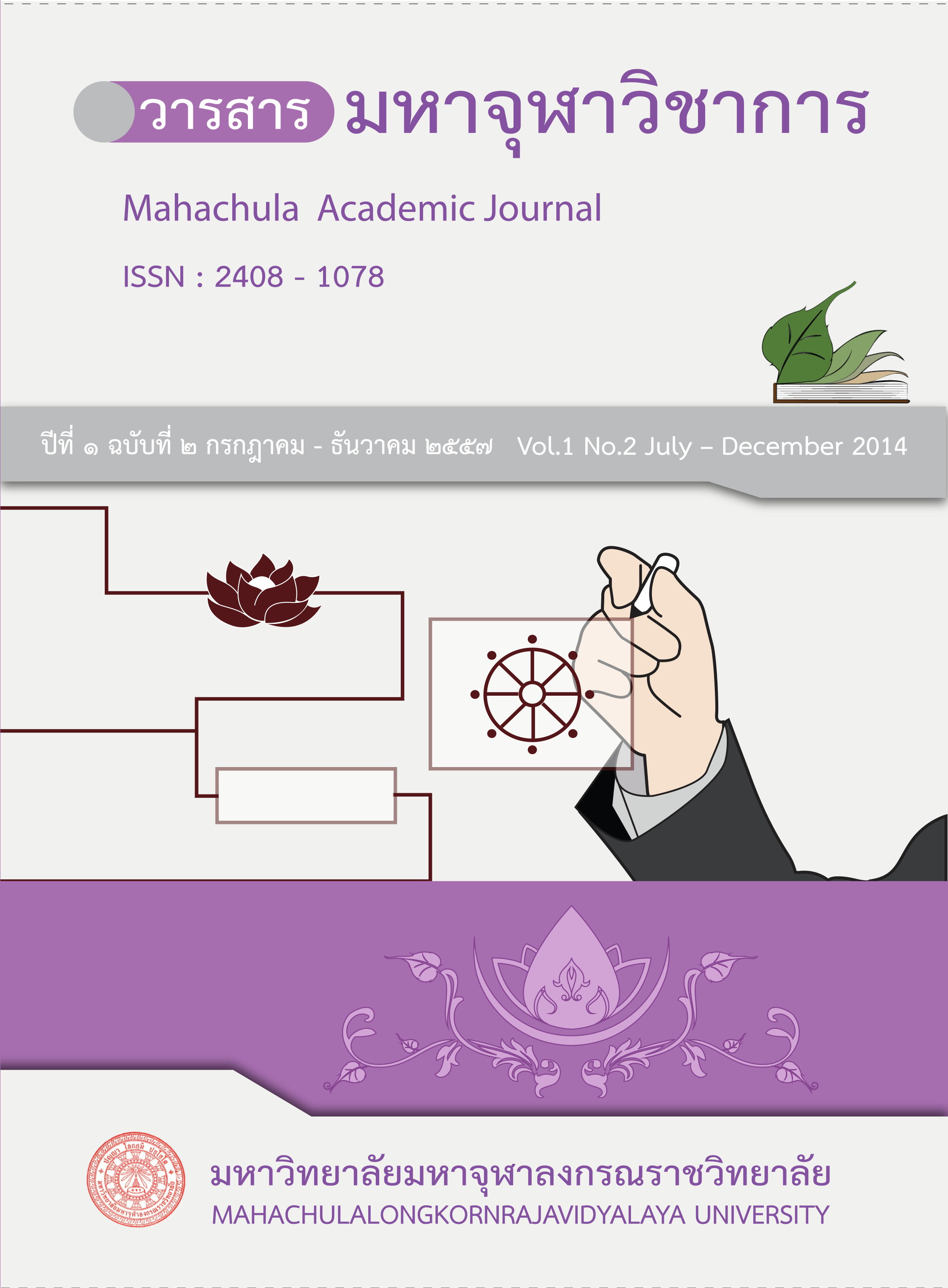The Doctrinal Virtues and the Ethics Possessed by the Educational Administrators
Main Article Content
Abstract
All of the schools are of the duties in giving the education to the student. for developing the students to have good knowledges and behaviors. The teachers are the important people in the management of the education. Especially, the educational administrators must administrate and manage the education rightly to cause the teachers to co-operate in training and the teaching the students to be of the good virtues and ethics. In the new aged administrators’ roles, the administrators must know how to apply the Doctrinal Principle to the administrative works, at present, the problems about the Virtues and the Ethics arising to the young Thai people are declined. That is say, the student do not likes to be in the regulations, without the order and the rules and use the strength to hurt one another. So, if the administrators are of good qualifications and bring the Buddhist Doctrines to be applined to their behaves, the other students will be developed and will be successful in according the set targets.
The Doctrinal Virtues are the good doctrines and the helping states.
The Ethics are the Doctrines to be the practised, the Precepts and the rules of the precepts.
The educational administrator is the person who is responsible for the process of carrying out the education to attain the aims set up by the organization according the set aim. The administrators are of the duty in setting up the plan, the organizing, the leading, and the controlling. In business organization the administrator is called manager, but in the governmental organization, he is called the administrator.
The educational ethics mean the standard of doing the work or the ethical measurement used by the administrators in the administration of the organization.
The qualifications of the administrators helping the minds to be good are the principles of the 4 Brahmavihara which are Metta, Karuṅā, Muditā, and Upeckkhā. Beside this, the administrators should have the following Doctrinal principles in administrating the works, which are 7 Sappurisadhamma, 4 Iddhipāda, 4 Saṅgahavatthu, 4 Gharāvāsa-dhamma, and Dasarājadhamma.
The virtues and the ethics are of the most importance in setting up the virtues and the ethics to young peple. This fact will help the children to be of the qualities, which will help everybody to have the happiness in oneself and in societies as well as in the world.
Article Details
References
กรมอาชีวศึกษา. “การปรับเปลี่ยนกรอบคุณธรรม จริยธรรม ค่านิยมและคุณลักษณะอันพึงประสงค์ของผู้สำเร็จการศึกษากรมอาชีวศึกษา”. (๒๙ กันยายน ๒๕๔๓) : ๑๔ (เอกสารอัดสำเนา).
ประภาศรี สีหอำไพ. พื้นฐานการศึกษาทางศาสนาและจริยธรรม. พิมพ์ครั้งที่ ๓. กรุงเทพมหานคร: สำนักพิมพ์แห่งจุฬาลงกรณ์มหาวิทยาลัย, ๒๕๔๓.
พระธรรมโกศาจารย์ (ประยูร ธมฺมจิตโต). พุทธวิธีบริหาร. พิมพ์ครั้งที่ ๔. กรุงเทพมหานคร: โรงพิมพ์มหาจุฬาลงกรณราชวิทยาลัย, ๒๕๔๙.
พระธรรมปิฎก (ป.อ. ปยุตฺโต). พจนานุกรมพุทธศาสน์ ฉบับประมวลศัพท์. พิมพ์ครั้งที่ ๙. กรุงเทพมหานคร: โรงพิมพ์มหาจุฬาลงกรณราชวิทยาลัย, ๒๕๔๓.
พระธรรมปิฎก (ป.อ. ปยุตฺโต). พุทธธรรม. กรุงเทพมหานคร: โรงพิมพ์มหาจุฬาลงกรณ์ราชวิทยาลัย, ๒๕๔๑.
พระธรรมปิฎก (ป.อ. ปยุตฺโต). พระพุทธศาสนาพัฒนาคนในสังคม. กรุงเทพมหานคร: กองการพิมพ์ฝ่ายประชาสัมพันธ์, ๒๕๔๐.
มหาวิทยาลัยมหาจุฬาลงกรณราชวิทยาลัย. พระไตรปิฎกภาษาไทย ฉบับมหาจุฬาลงกรณราชวิทยาลัย เล่ม ๑๐, ๑๑, ๒๐, ๒๓, ๒๕. กรุงเทพมหานคร: โรงพิมพ์มหาจุฬาลงกรณราชวิทยาลัย, ๒๕๓๙.
วิโรจน์ สารรัตนะ. การบริหารการศึกษาหลักการ ทฤษฎี หน้าที่ ประเด็นและบทวิเคราะห์. พิมพ์ครั้งที่ ๔. กรุงเทพมหานคร: โรงพิมพ์ทิพยวิสุทธิ์, ๒๕๔๖.


